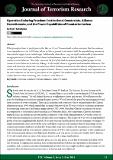Files in this item
Operation Enduring Freedom: institutional constraints, alliance commitments, and the power capabilities of counterterrorism
Item metadata
| dc.contributor.author | Kattelman, Kyle T. | |
| dc.coverage.spatial | 18 | en_US |
| dc.date.accessioned | 2014-06-30T14:11:53Z | |
| dc.date.available | 2014-06-30T14:11:53Z | |
| dc.date.issued | 2014-06-02 | |
| dc.identifier.citation | Kattelman, K. (2014). Operation Enduring Freedom: Institutional Constraints, Alliance Commitments, and the Power Capabilities of Counterterrorism. Journal Of Terrorism Research, 5(2), pp. 12-29. | en_US |
| dc.identifier.issn | 2049-7040 | en_US |
| dc.identifier.uri | http://ojs.st-andrews.ac.uk/index.php/jtr/article/view/880/728 | en_US |
| dc.identifier.uri | https://hdl.handle.net/10023/4926 | |
| dc.description.abstract | What prompted states to participate in the War on Terror? Conventional wisdom concludes that the endeavor is an unpopular exercise in US imperialism, yet this argument is juxtaposed with the overwhelming amount of international support in its initial stages. Additionally, while there is a great depth and breadth of information on aggregate terrorist attacks and their theoretical motivation, there is relatively little with regards to counterterrorist behavior. This study represents the first of its kind to examine from a global perspective the counterterrorist behavior of states by linking it to the conflict theories of general and immediate deterrence. The results will show how democratic characteristics inhibit military commitment while alliance obligations act as an outside constraint that engenders preemptive behavior. However, once committed militarily, state capabilities are the main influence on the level of preemptive action applied. This analysis supports the utilization of traditional conflict theories when examining state counterterrorist behavior. | en_US |
| dc.language.iso | en | en_US |
| dc.publisher | Centre for the Study of Terrorism and Political Violence, University of St Andrews | en_US |
| dc.relation.ispartof | Journal of Terrorism Research | en_US |
| dc.rights | This is an open access article published in Journal of Terrorism Research. This work is licensed under a Creative Commons Attribution 3.0 License (http://creativecommons.org/licenses/by/3.0/) | en_US |
| dc.rights.uri | http://creativecommons.org/licenses/by/3.0/ | |
| dc.subject | terrorism | en_US |
| dc.subject | counterterrorism | en_US |
| dc.subject | alliances | en_US |
| dc.subject | collective action | en_US |
| dc.subject.lcc | HV6431 | en_US |
| dc.subject.lcsh | Terrorism | en_US |
| dc.subject.lcsh | Terrorism -- Prevention | en_US |
| dc.subject.lcsh | Operation Enduring Freedom, 2001- | en_US |
| dc.title | Operation Enduring Freedom: institutional constraints, alliance commitments, and the power capabilities of counterterrorism | en_US |
| dc.type | Journal article | en_US |
| dc.description.version | https://doi.org/Publisher PDF | en_US |
| dc.publicationstatus | Published | en_US |
| dc.status | Peer reviewed | en_US |
| dc.identifier.doi | https://doi.org/http://doi.org/10.15664/jtr.880 | en |
This item appears in the following Collection(s)
Except where otherwise noted within the work, this item's licence for re-use is described as This is an open access article published in Journal of Terrorism Research. This work is licensed under a Creative Commons Attribution 3.0 License (http://creativecommons.org/licenses/by/3.0/)
Items in the St Andrews Research Repository are protected by copyright, with all rights reserved, unless otherwise indicated.


